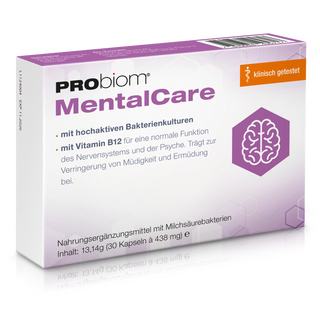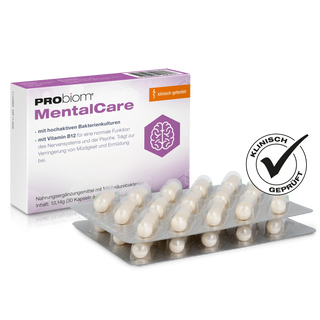Constipation – medically known as obstipation – is a topic many people are reluctant to talk about, yet it affects a great many. Symptoms range from a bloated stomach and infrequent or difficult bowel movements to discomfort and pain. Fortunately, there are many effective measures that can help with constipation – in a natural and gentle way. Our gut microbiome, the community of bacteria in our digestive tract, also plays a crucial role.
What exactly is constipation?
Constipation is generally defined as bowel movements occurring less than three times a week, often hard and dry, and accompanied by the feeling of not being able to empty the bowel completely. The causes can be varied: from diet and lack of exercise to psychological stress. The microbiome —the composition of our intestinal bacteria—also plays an important role.
Causes: Why does constipation occur?
Unhealthy diet
A low-fiber diet is one of the most common triggers. Fiber—especially from whole grains, vegetables, fruits, and legumes—provides bulk to stools and stimulates bowel movements.
dehydration
Water plays a crucial role in digestion. If the body doesn't get enough fluids, water is removed from the intestinal contents, causing stools to become hard and drier than usual.
Lack of exercise
Physical activity promotes natural bowel movement, known as peristalsis. If you don't exercise enough, you risk your bowels becoming sluggish.
Stress and psychological factors
The emotional component should not be underestimated: the so-called abdominal brain – a network of nerves in the intestine – reacts sensitively to psychological stress and can cause digestive problems.
What helps against constipation? These measures can help
A healthy lifestyle is key to preventing and treating constipation. The following tips are not only effective but also easy to implement:
1. High-fiber diet:
Consciously choose foods that contain a lot of indigestible plant fiber—such as oatmeal, whole-grain bread, flaxseed, psyllium husks, apples, or carrots. These swell in the intestines and stimulate bowel activity.
2. Drink enough:
Your goal should be to drink at least 1.5 to 2 liters of water or unsweetened tea per day. Adequate fluid intake is especially important when eating a high-fiber diet.
3. Regular exercise:
Daily exercise – be it a brisk walk, cycling or yoga – activates the digestive tract and helps the body maintain its rhythm.
4. Relaxed toilet habits:
Take your time with bowel movements, go straight to the toilet when needed, and avoid pressure or stress. A small stool under your feet can improve posture and facilitate emptying.
5. Proven home remedies:
Dried plums, preferably soaked in water overnight, are a tried-and-true home remedy for constipation. Warm water with lemon on an empty stomach can also stimulate digestion.
The microbiome – the underestimated helper in digestion
Approximately 100 trillion microorganisms live in our intestines – together they form what's known as the microbiome . These tiny helpers are not only important for our immune system, but also crucial for digestion.
A balanced microbiome supports the breakdown of fiber and produces short-chain fatty acids that promote intestinal motility. If this balance is disrupted—for example, due to poor diet, stress, or medications such as antibiotics—digestion can become sluggish.
A gut-friendly diet is crucial to maintaining the microbiome. This can be helped by:
-
Probiotic foods such as natural yogurt, kefir, sauerkraut or kimchi that contain live cultures.
-
Prebiotics such as inulin and resistant starch, which serve as food for the "good" bacteria (e.g., in chicory, onions, garlic, oats). Probiotics clinically tested for stress-related digestive disorders, such as Lactobacillus helveticus Rosell®-52 and Bifidobacterium longum Rosell®-175, can also be helpful for constipation.
-
Avoid sugar and highly processed foods , which can disrupt bacterial balance.
Conclusion: With natural remedies against constipation – and for a strong microbiome
Constipation is annoying, but in most cases, it's easy to manage. Plenty of exercise, a high-fiber diet, sufficient water, and healthy stress management form the basis for healthy digestion. At the same time, you should pay attention to your microbiome—because the digestive tract only functions reliably with an intact intestinal flora.













